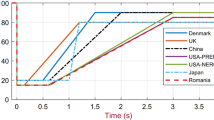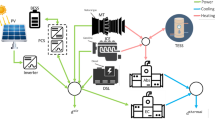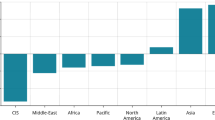Abstract
With the increase in energy demand and carbon emission requirements, energy management and CO2 emission reduction on the user side are significant for integrated energy system (IES) scheduling. This paper constructs a two-stage optimal dispatching model combining active/passive demand response (DR) and reward and punishment ladder-type carbon trading. In the first stage, the electricity/gas load was optimized by adding a logistics function to the active DR model. A passive DR model is built based on the optimized electric load and the heat/cooling–electricity ratio of the cogeneration unit to optimize the heat/cooling load. In the second stage, a multi-objective IES model based on the optimized load and reward and punishment ladder carbon trading was solved by the golden eagle multi-objective optimization (MOGEO). Analyzing the scheduling results from different scenarios, the active/passive DR model can reduce the load peak-to-valley difference and improve user satisfaction and grid revenue. At the same time, the combination of reward and punishment ladder carbon trading makes the system gain more carbon revenue, reduces system operating costs and carbon emissions, and improves energy utilization.









Similar content being viewed by others
Availability of data and materials
The datasets used and analyzed during the current study are available from the corresponding author upon reasonable request.
References
Jinghua L, Mengshu Z, Yuejiang L (2021) Review on optimal scheduling of integrated energy systems. Power Syst Technol 45(06):2256–2272
Fang J, Zeng Q, Ai X (2017) Dynamic optimal energy flow in the integrated natural gas and electrical power systems. IEEE Trans Sustain Energy 9(1):188–198
Qin X, Shen X, Sun H (2019) A quasi-dynamic model and corresponding calculation method for integrated energy system with electricity and heat. Energy Procedia 158:6413–6418
Yang C, Peng Z, Zheng W (2021) Multiple time scales scheduling strategy of wind power accommodation considering energy transfer characteristics of carbon capture power plant. Proc CSEE 41(3):946–960
Mansouri SA, Ahmarinejad A, Javadi MS (2020) Two-stage stochastic framework for energy hubs planning considering demand response programs. Energy 206:118124
Li X, Wang W, Wang H (2021) Hybrid time-scale energy optimal scheduling strategy for integrated energy system with bilateral interaction with supply and demand. Appl Energy 285:116458
Li N, Wang X, Zhu Z et al (2020) The reliability evaluation research of distribution system considering demand response. Energy Rep 6:153–158
Tao Z, Jing L, Xiaolei Y (2021) Economic dispatch of microgrid considering active/passive demand response and conditional value at risk. High Voltage Eng 47(09):3292–3304
Zhongfu AT (2015) The optimization model for multi-type customers assisting wind power consumptive considering uncertainty and demand response based on robust stochastic theory. Energy Convers Manag 105:1070–1081
Tianyuan F, Haiyun W, Weiqing W (2022) Coordinated optimization scheduling of microgrid and distribution network based on cooperative game considering active/passive demand respons. Power Syst Technol 46(02):453–463
Shibo Y, Liang S, Lidong C (2021) Coordinated optimal scheduling of distribution network with CCHP-based microgird considering time-of-use electricity price. Electric Power Autom Equip 41(04):15–23
Liying W, Jialin L, Honqi D (2022) Optimal dispatch of integrated energy system considering ladder-type carbon trading. J Syst Simul 34(07):1393–1404
Dengyong C, Fang L, Shuai L (2022) Optimization of virtual power plant scheduling coupling with P2G-CCS and doped with gas hydrogen based on stepped carbon trading. Power Syst Technol 46(06):2042–2054
Xiaohui Z, Xiaoyan L, Jiaqing Z (2020) Integrated energy system planning considering a reward and punishment ladder-type carbon trading and electric-thermal transfer load uncertainty. Proc CSEE 40(19):6132–6142
Rui W, Shan C, Ye L (2022) Master-slave game optimal scheduling of energy hub based on integrated demand response and a reward and punishment ladder carbon trading mechanism. Power Syst Protect Control 50(08):75–85
Rong H, Milu Z, Zhenkun L (2018) Optimal operation for CCHP system considering shiftable loads. Power Syst Technol 42(03):715–721
Zhisheng Z, Daolin Y (2018) RBF-NN based short-term load forecasting model considering comprehensive factors affecting demand response. Proc CSEE 38(06):1631–1638
Tianyuan F, Haiyun W, Weiqing W (2022) Coordinated optimization scheduling of microgrid and distribution network based on cooperative game considering active/passive demand response. Power Syst Technol 46(02):453–463
Mohammadi-Balani A, Nayeri MD, Azar A, Taghizadeh-Yazdi M (2020) Golden eagle optimizer: a nature-inspired metaheuristic algorithm. Comput Ind Eng 152:107050
Funding
The authors thank the project supported by the National Natural Science Foundation of China (52007103).
Author information
Authors and Affiliations
Contributions
Tao Zhang and Jin Wang wrote the main manuscript text and prepared figures. All authors reviewed the manuscript.
Corresponding author
Ethics declarations
Ethical approval
All procedures performed in studies involving human participants were in accordance with the ethical standards of the institutional and/or national research committee. Written informed consent for participation and publication of this paper was obtained from the College of Electrical Engineering and New Energy, China Three Gorges University, State Grid Hubei Electric Power Research Institute, and all authors.
Competing interests
The authors declare no potential financial or personal conflict of interest with the research, authorship, and publication of this article.
Additional information
Publisher's Note
Springer Nature remains neutral with regard to jurisdictional claims in published maps and institutional affiliations.
Rights and permissions
Springer Nature or its licensor (e.g. a society or other partner) holds exclusive rights to this article under a publishing agreement with the author(s) or other rightsholder(s); author self-archiving of the accepted manuscript version of this article is solely governed by the terms of such publishing agreement and applicable law.
About this article
Cite this article
Zhang, T., Wang, J., Mei, X. et al. Integrated energy optimization scheduling with active/passive demand response and reward and punishment ladder carbon trading. Electr Eng 105, 2923–2934 (2023). https://doi.org/10.1007/s00202-023-01865-9
Received:
Accepted:
Published:
Issue Date:
DOI: https://doi.org/10.1007/s00202-023-01865-9




